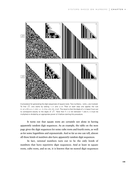It turns out that square roots are certainly not alone in having apparently random digit sequences. As an example, the table on the next page gives the digit sequences for some cube roots and fourth roots, as well as for some logarithms and exponentials. And so far as one can tell, almost all these kinds of numbers also have apparently random digit sequences.
In fact, rational numbers turn out to be the only kinds of numbers that have repetitive digit sequences. And at least in square roots, cube roots, and so on, it is known that no nested digit sequences
A procedure for generating the digit sequences of square roots. Two numbers, r and s, are involved. To find Sqrt[n] one starts by setting r=n and s=0. Then at each step one applies the rule {r, s} -> If[r >= s+1, {4(r–s–1), 2(s+2)}, {4r, 2s}]. The result is that the digits of s in base 2 turn out to correspond exactly to the digits of Sqrt[n]. Note that if n is not between 1 and 4, it must be multiplied or divided by an appropriate power of 4 before starting this procedure.




